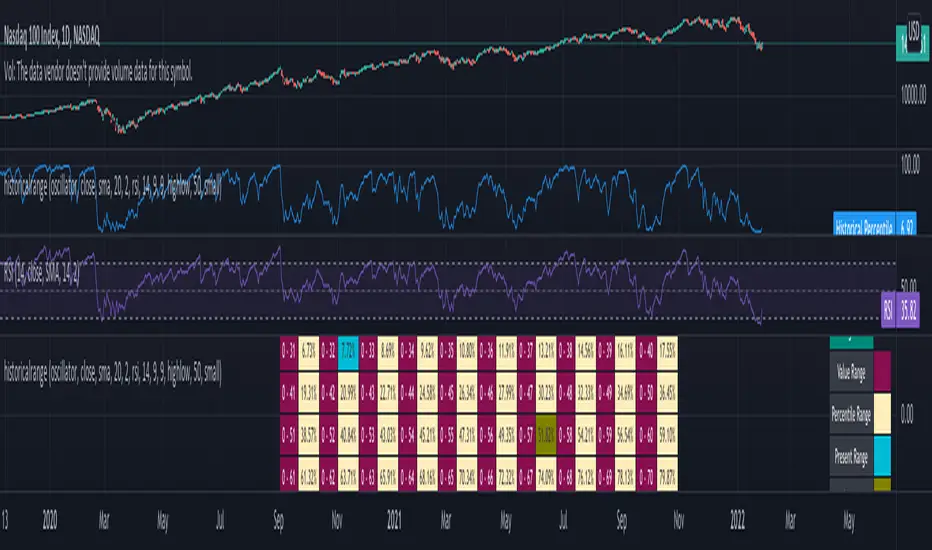historicalrange

Library provices a method to calculate historical percentile range of series.
hpercentrank(source) calculates historical percentrank of the source
Parameters:
source: Source for which historical percentrank needs to be calculated. Source should be ranging between 0-100. If using a source which can beyond 0-100, use short term percentrank to baseline them.
Returns: pArray - percentrank array which contains how many instances of source occurred at different levels.
upperPercentile - percentile based on higher value
lowerPercentile - percentile based on lower value
median - median value of the source
max - max value of the source
distancefromath(source) returns stats on historical distance from ath in terms of percentage
Parameters:
source: for which stats are calculated
Returns: percentile and related historical stats regarding distance from ath
distancefromma(maType, length, source) returns stats on historical distance from moving average in terms of percentage
Parameters:
maType: Moving Average Type : Can be sma, ema, hma, rma, wma, vwma, swma, highlow, linreg, median
length: Moving Average Length
source: for which stats are calculated
Returns: percentile and related historical stats regarding distance from ath
bpercentb(source, maType, length, multiplier, sticky) returns percentrank and stats on historical bpercentb levels
Parameters:
source: Moving Average Source
maType: Moving Average Type : Can be sma, ema, hma, rma, wma, vwma, swma, highlow, linreg, median
length: Moving Average Length
multiplier: Standard Deviation multiplier
sticky: - sticky boundaries which will only change when value is outside boundary.
Returns: percentile and related historical stats regarding Bollinger Percent B
kpercentk(source, maType, length, multiplier, useTrueRange, sticky) returns percentrank and stats on historical kpercentk levels
Parameters:
source: Moving Average Source
maType: Moving Average Type : Can be sma, ema, hma, rma, wma, vwma, swma, highlow, linreg, median
length: Moving Average Length
multiplier: Standard Deviation multiplier
useTrueRange: - if set to false, uses high-low.
sticky: - sticky boundaries which will only change when value is outside boundary.
Returns: percentile and related historical stats regarding Keltener Percent K
dpercentd(useAlternateSource, alternateSource, length, sticky) returns percentrank and stats on historical dpercentd levels
Parameters:
useAlternateSource: - Custom source is used only if useAlternateSource is set to true
alternateSource: - Custom source
length: - donchian channel length
sticky: - sticky boundaries which will only change when value is outside boundary.
Returns: percentile and related historical stats regarding Donchian Percent D
oscillator(type, length, shortLength, longLength, source, highSource, lowSource, method, highlowLength, sticky) oscillator - returns Choice of oscillator with custom overbought/oversold range
Parameters:
type: - oscillator type. Valid values : cci, cmo, cog, mfi, roc, rsi, stoch, tsi, wpr
length: - Oscillator length - not used for TSI
shortLength: - shortLength only used for TSI
longLength: - longLength only used for TSI
source: - custom source if required
highSource: - custom high source for stochastic oscillator
lowSource: - custom low source for stochastic oscillator
method: - Valid values for method are : sma, ema, hma, rma, wma, vwma, swma, highlow, linreg, median
highlowLength: - length on which highlow of the oscillator is calculated
sticky: - overbought, oversold levels won't change unless crossed
Returns: percentile and related historical stats regarding oscillator
Pine Bibliothek
Ganz im Sinne von TradingView hat dieser Autor seinen/ihren Pine Code als Open-Source-Bibliothek veröffentlicht. Auf diese Weise können nun auch andere Pine-Programmierer aus unserer Community den Code verwenden. Vielen Dank an den Autor! Sie können diese Bibliothek privat oder in anderen Open-Source-Veröffentlichungen verwenden. Die Nutzung dieses Codes in einer Veröffentlichung wird in unseren Hausregeln reguliert.
Subscribe - trendoscope.io/pricing
Blog - docs.trendoscope.io
Haftungsausschluss
Pine Bibliothek
Ganz im Sinne von TradingView hat dieser Autor seinen/ihren Pine Code als Open-Source-Bibliothek veröffentlicht. Auf diese Weise können nun auch andere Pine-Programmierer aus unserer Community den Code verwenden. Vielen Dank an den Autor! Sie können diese Bibliothek privat oder in anderen Open-Source-Veröffentlichungen verwenden. Die Nutzung dieses Codes in einer Veröffentlichung wird in unseren Hausregeln reguliert.
Subscribe - trendoscope.io/pricing
Blog - docs.trendoscope.io